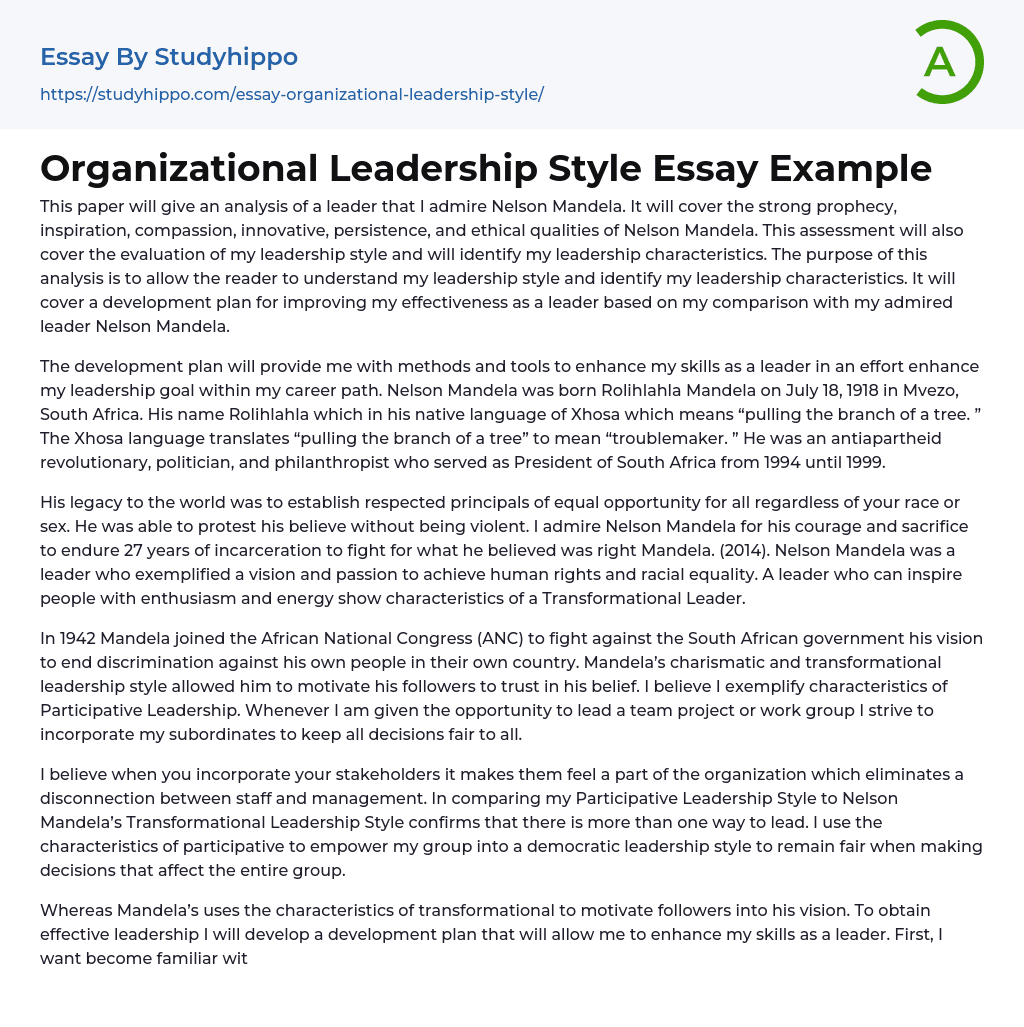In this paper, I will examine the leadership qualities of Nelson Mandela, a leader whom I deeply respect. The main emphasis will be on his remarkable attributes such as prophecy, inspiration, compassion, innovation, persistence, and ethics. Additionally, I will assess my own leadership style and identify my unique characteristics as a leader. The goal of this analysis is to provide readers with an understanding of my approach to leadership and traits. Furthermore, it will outline a development plan designed to improve my effectiveness as a leader by using Nelson Mandela's exceptional leadership as a standard.
The development plan will provide me with the techniques and resources necessary to enhance my leadership skills and achieve my career goal of becoming a leader. Nelson Mandela, also known as Rolihlahla Mandela, was born on Jul
...y 18, 1918 in Mvezo, South Africa. In the Xhosa language, his name means "troublemaker," which translates to "pulling the branch of a tree." Mandela played a crucial role in combating apartheid and served as President of South Africa from 1994 to 1999. He was not only an antiapartheid revolutionary but also a politician and philanthropist.
Nelson Mandela's legacy lies in the creation of principles that upheld equal opportunity for everyone, regardless of race or gender. He commendably stood up for his beliefs without resorting to violence, and I deeply respect him for his bravery and selflessness in enduring 27 years of imprisonment while fighting for what he believed was just. As stated by Nelson Mandela (2014), he was a leader who displayed a visionary and passionate dedication towards attaining human rights and racial equality. Mandela possessed qualities such a
enthusiasm and energy, which made him an inspiring Transformational Leader capable of motivating people.
In 1942, Mandela joined the African National Congress (ANC) to combat the discriminatory practices of the South African government towards his people. Mandela's leadership style was both charismatic and transformational, fostering trust among his followers and advocating for equality. Personally, I demonstrate traits of Participative Leadership by actively involving my subordinates in team projects and work groups, ensuring fair decision-making for all participants.
In my opinion, involving stakeholders creates a sense of belonging and reduces the gap between staff and management. Comparing my Participative Leadership Style to Nelson Mandela’s Transformational Leadership Style proves that there are multiple approaches to leadership. I utilize the qualities of participative leadership to empower my team through a democratic style, ensuring fairness when making decisions that impact the entire group.
Mandela utilized the elements of transformational leadership to inspire his followers towards his vision. In order to enhance my leadership abilities, I will create a development plan. Initially, I aim to gain knowledge in various leadership theories, enabling me to adjust my skills based on the specific requirements of the workplace. Furthermore, I will strive to incorporate these diverse leadership theories into any leadership opportunities that come my way.
Last, my aim is to motivate subordinates to align their thinking with the organization's goals. According to Prive (2012), a great leader possesses qualities such as honesty, delegation, communication, humor, confidence, commitment, positive attitude, creativity, intuition, and inspiration. By enhancing these top 10 qualities, I can effectively use my leadership skills to achieve my career goal.
- Being A Leader essays
- Servant Leadership essays
- Leadership Experience essays
- Leadership Qualities essays
- Board Of Directors essays
- Brand Management essays
- Business Ethics essays
- Business Management essays
- Change Management essays
- Comparative Analysis essays
- Decision Making essays
- Dispute Resolution essays
- Knowledge Management essays
- Leadership essays
- Leadership and Management essays
- Manager essays
- Operations Management essays
- Performance Management essays
- Product Management essays
- Project Management essays
- Quality Management essays
- Risk essays
- Risk Management essays
- Scientific Management essays
- Stress Management essays
- supply chain management essays
- Time Management essays
- Total Quality Management essays
- Cuban Missile Crisis essays
- Fidel Castro essays
- French Revolution essays
- Han Dynasty essays
- Hiroshima essays
- Imperialism essays
- Jack The Ripper essays
- Mao Zedong essays
- Middle Ages essays
- Mongols essays
- Nelson Mandela essays
- Ottoman Empire essays
- Reformation essays
- Reign of Terror essays
- Renaissance essays
- Roaring Twenties essays
- Romanticism essays
- Samurai essays
- Scientific Revolution essays
- Soviet Union essays
- Abnormal Psychology essays
- Abraham Maslow essays




